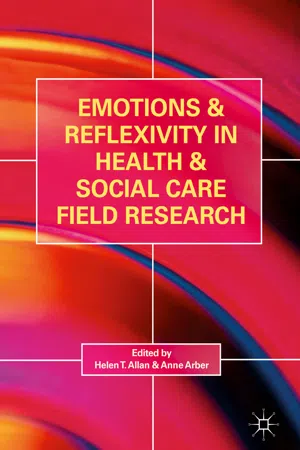Introduction
This book is about researchers’ experiences of doing emotional reflexivity in health and social care settings. While reflexivity has become an integral part of research practice and supervision (Seale, 1999) and a defining feature of qualitative research (Finlay, 2002), questions remain about how to go about doing emotional reflexivity. Researchers in health and social care settings like other researchers are part of the social worlds they study. They may have multiple identities such as practitioner, counsellor as well as researcher, and they may be motivated to research in certain areas because they have experienced illness themselves. Researchers’ experiences, interactions, emotional involvement and reflections on what they observe form parts of the research process, data analysis and the written account, and are the means by which knowledge is developed (Hammersley, 1992).
Reflexivity in ethnography and field research helps researchers to integrate social reality in the sense that, in being reflexive, the experience of the researcher is acknowledged, and his/her interactions with self and seeing the self from the other’s perspective are integrated into field experience and written accounts (Hammersley & Atkinson, 1983; Rosenberg, 1990). We are interested in the taken-for-granted and often unexplored aspects of research such as the emotion work necessary to getting a study under way and the messy research realities that go undocumented, undiscussed and undisclosed; we argue that messy realities motivate us towards emotional reflexivity. Making our accounts and experiences available to others is the goal of this book. We hope to engage postgraduate researchers and supervisors in what we have learned by casting a reflexive eye on emotions in the field.
All the contributors to this book believe that emotions are inherent to knowledge production during the research process (Hochschild, 1983; Jaggar, 1989; Walkerdine, Lucey, & Melody, 2001; Holland, 2008); equally that credible research is as much about how you sample from your population as it is about how you situate yourself in the research (Neuman & Neumann, 2015). When planning and designing research, we may be unaware of our own emotional involvement in topics. In fact, we may with hindsight be blind to our own motivation in choosing certain topics (Neuman & Neumann, 2015; Pillow, 2003). Some sensitive research situations such as those involving end-of-life situations can be challenging. For example, personal and professional experiences of illness may come together, leading to heightened sensitivity within the research. These experiences are discussed in the chapters that follow.
In this book we argue for an emotional reflexivity. Our approach to using emotional reflexivity enables insight into ourselves and others. When we are aware of what we and our research participants are experiencing, this can lead to ‘empathic insight’ (Boden, Gibson, Owen, & Benson, 2016). It is impossible, we suggest, to understand the illness experience without trying to understand the emotional experience of an illness that is shared with us and observed by us, and such experiences require reflection and interpretation (Boden et al., 2016). Emotional reflexivity enables the impact of the research on the researcher and the participants to become visible rather than hidden and leads to rich insights as emotions motivate us to reflexivity. We have observed that the emotional impact of research is messy, challenging as well as rewarding. In this book we explore what doing emotional reflexivity consists of using the practical aspects of field research experienced by the contributors to the book.
Aims of the Book
In this book we have three aims:
Explore how emotions motivate reflexivity in research practice
Explore emotional involvement in the field
Identify reflexive strategies which can be adopted through journaling, internal dialogues , peer support, clinical as well as academic supervision
Through the stories told by the contributors to this book, we unpack what emotional involvement in field research means for doing reflexivity. As reflexivity is a complex term with many interpretations, we define what this term means for each of us in each chapter. We expand the concept of emotional reflexivity as a pervasive element of reflexivity (Rosenberg, 1990), and an aspect of reflexivity which includes feelings (Boden et al., 2016). Using emotional reflexivity helps us to recognize our own emotions during fieldwork such as feelings of anger, injustices, embarrassment, sadness and numbness through observations of body language and our senses; in order to interpret these reflexively. In this book we draw on research carried out in highly sensitive settings including palliative care , adoption for people who are human immunodeficiency virus (HIV) positive, end-of-life care in Africa, couples and infertility, and young people who bully to explore the troubles and rewards experienced in the field.
All the contributing authors have a dual identity as researchers and health or social work professionals—Kit Tapson is a researcher and counsellor with young people; Tam Chipawe Cane is a social worker and researcher; Helen Allan, Anne Arber and Sarah Li are social scientists and trained nurses; Nicola Ayers as well as being a trained nurse has worked with refugees in Yemen and Ginny Mounce is a researcher and midwife. Doing research in sensitive settings involving loss, grief and social exclusion can be burdensome to the researcher. We found that in writing this book, the researchers did not always have the support they needed during fieldwork; in fact, they sometimes felt that their emotional involvement in the research was not relevant to academic supervision and that it was a private matter to find their own resources for support. Being aware of the emotional impact of research is important as researchers are human beings, and seeing and hearing devastating stories can be unsettling and upsetting.
Research Relationships and Emotions
The difficulty of being alive to emotions in the field and being at risk from those emotions is well described in work by Pillow (2003), Ramsay (1996) and Down, Garrety, and Badham (2006). The risks can be intensified if the field is gendered (Bloor, Fincham, & Sampson, 2007) or if the “amount of emotion work [the researcher does] in order not to show emotions” is burdensome (Down et al., 2006 cited by Holland, 2008, p. 19). All of the contributing chapters in this book illustrate how “the face-to-face proximity of the researchers to people whose stories are heavy with ...


